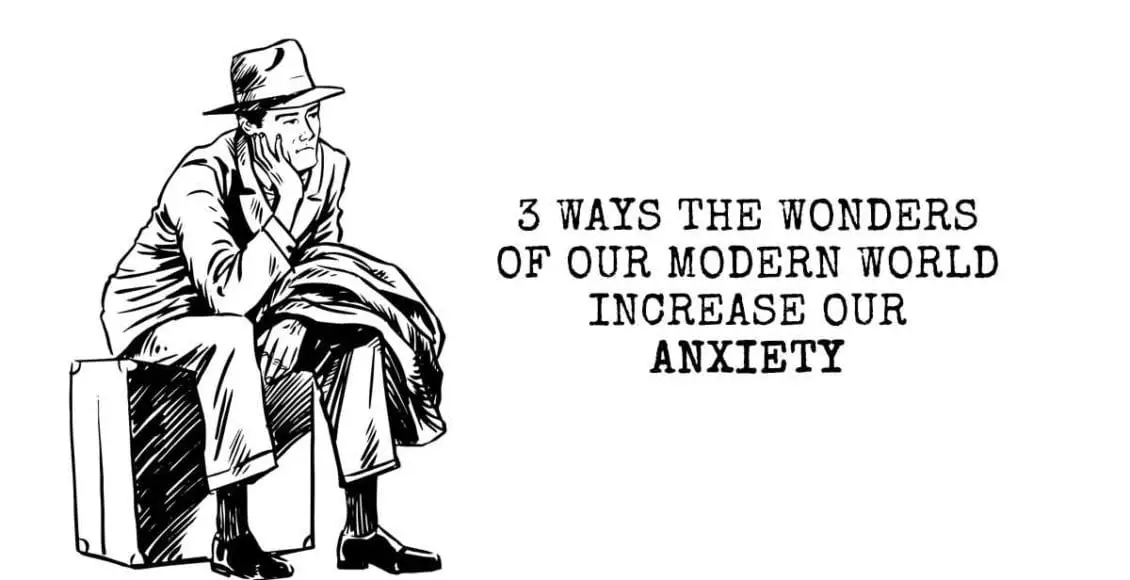The convenience of our modern world is an incredible thing. We have endless information at our fingertips. We can have a sandwich, a car, or even a message delivered to our door at a moment’s notice. We can communicate with friends and family around the world instantaneously.
As modern humans, we have more convenience and ease of life than ever before.
Why, then, are we seeing such a significant increase in stress and anxiety disorders?
Although chemical imbalances and trauma certainly play a part in this dynamic, there is another force at work that often gets overlooked.
According to many evolutionary psychologists, human beings have created a world that we, ourselves, are ill-equipped to manage from a biological perspective. Our body’s response to stress is aligned to the level of anxiety one might feel when being chased by a predator, or encountering an event that is otherwise life-threatening. Fortunately, this is not a situation most modern people confront on a daily basis. As a result, our biological response to the stressors we do face – social difficulties, financial problems, interpersonal conflicts – is now completely out of proportion.
We have evolved to feel anxiety in a way that no longer serves us.
This effect is magnified by the fact that most of our modern stressors did not exist during humanity’s early evolution. Here are three modern conveniences that actually stress us out from an evolutionary perspective:
1. Our global economy provides more opportunity – and more competition.
Our capitalist economy is more efficient than ever before. If you can provide a good product or service for a fair price, you have unprecedented power and opportunity to find success in the economic landscape. You will also have an unprecedented amount of competition. Education, though still a privilege, is more accessible than ever before. People are earning degrees in greater numbers, causing fields that used to be secure to become more competitive. More people have the opportunity to play the game – and the stakes have grown greater than ever before.
Job security has become difficult to come by. Expectations have been raised. We are working harder in an effort to get ahead – or even just to keep up. This profoundly impacts our stress levels and sense of security. We fear that slowing down – even just for a second – could lose us the chance to provide for our families.
2. Modern technology promotes unrealistic standards.
Through social media, we have a new and fascinating opportunity to see into other people’s lives. We also have the power to manage exactly what people see and what they don’t. Most of the images we see on Instagram are – literally and figuratively – photoshopped beyond realism. We post pictures of perfect bodies, happy children, and expensive vacations. We keep our messy houses and failing marriages to ourselves. We only see the best parts of other peoples’ lives – and there’s no regulation of whether these moments are real or fictitious.
The standards we hold ourselves to become completely unattainable. It’s natural to feel like we’re falling behind. As a result, our self-esteem suffers. We wonder why we can’t achieve Pinterest-perfection like everyone else seems to. In the end, our evolutionary need for acceptance falls into jeopardy. A person can start to feel isolated and inferior – when in reality they are just like everyone else.
3. Our access to information can leave us confused, disoriented, and ultimately unsure of ourselves.
In ancient times, a person would likely spend an entire lifetime interacting only with the members of their own tribe. The members of this community would primarily share the same experiences, information, opinions, and ideas. Consider having a discussion about politics with a similarly-minded friend. You would feel good about yourself – but you would learn nothing. Access to diversity is important because it gives us a chance to learn, change, and grow. Unfortunately, growth is inherently stressful.
The same concept applies to our ability to read the news. Learning about the horrors of war and starvation that affect many parts of the world is uncomfortable. It is also indescribably important. A social conscience and sense of global awareness are integral to being a good person. However, these things are not created without enduring a significant amount of anxiety.
“Anxiety is the dizziness of freedom,” wrote Søren Kierkegaard.
The freedom available in today’s world is a wonderful thing. However, we do need to be conscious of how it affects our stress levels. Be intentional when it comes to self-care. Don’t allow the anxiety of modern life to get the best of you.



